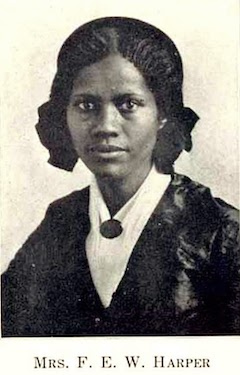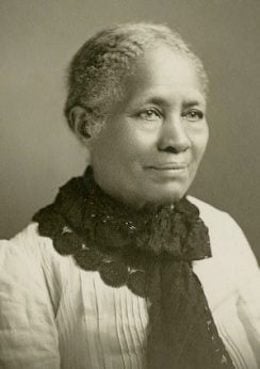Inspiring Speeches by Frances Watkins Harper, 19th-Century Reformer & Author
By Nava Atlas | On January 25, 2019 | Updated March 23, 2020 | Comments (1)

Frances Ellen Watkins ( 1825 – 1911), later known as Frances Watkins Harper or Frances E.W. Harper, built her reputation on her various talents, including fiction, essays, poetry, and public speaking. Following, we’ll explore the activist wisdom in portions of the speeches of Frances Watkins Harper.
One of America’s first and most successful African-American authors, she was also an active abolitionist, feminist, and conductor on the Underground Railroad.
She launched her writing career in the late 1830s by publishing essays in antislavery journals. At age twenty, her first collection of poems, Autumn Leaves, was published in 1845. She was the first black author to have a short story published (“The Two Offers”) and one of the first to publish a novel (Iola Leroy, 1892).
It was during the 1850s, after the Fugitive Slave Act was passed, that Harper found her voice as a speaker. From that time on, she was in great demand as an orator — hers was a powerful voice promoting African-American and women’s rights. Here are some inspiring excerpts from speeches by Frances Watkins Harper, a 19th-century crusader for justice who shouldn’t be forgotten.
The great bundle of humanity
“We are all bound up together in one great bundle of humanity, and society cannot trample on the weakest and feeblest of its members without receiving the curse in its own soul. You tried that in the case of the Negro…
You white women speak here of rights. I speak of wrongs. I, as a colored woman, have had in this country an education which has made me feel as if I were in the situation of Ishmael, my hand against every man, and every man’s hand against me…
While there exists this brutal element in society which tramples upon the feeble and treads down the weak, I tell you that if there is any class of people who need to be lifted out of their airy nothings and selfishness, it is the white women of America.”
(from a speech at the National Women’s Rights Convention, 1866)
. . . . . . . . . .

Learn more about Frances Watkins Harper
. . . . . . . . . .
A claim upon the nation for justice
“I deem it a privilege to present the Negro, not as a mere dependent asking for Northern sympathy or Southern compassion, but as a member of the body politic who has a claim upon the nation for justice, simple justice, which is the right of every race, upon the government for protection, which is the rightful claim of every citizen, and upon our common Christianity for the best influences which can be exerted for peace on earth and goodwill to man.”
The rights of life and liberty to all
“There are some rights more precious than the rights of property or the claims of superior intelligence: they are the rights of life and liberty, and to these the poorest and humblest man has just as much right as the richest and most influential man in the country.
Ignorance and poverty are conditions which men outgrow. Since the sealed volume was opened by the crimson hand of war, in spite of entailed ignorance, poverty, opposition, and a heritage of scorn, schools have sprung like wells in the desert dust.
It has been estimated that about two millions have learned to read…. Millions of dollars have flowed into the pockets of the race, and freed people have not only been able to provide for themselves, but reach out their hands to impoverished owners.”
(this and the except above are from a speech before the meeting of the National Council of Women, February 23, 1891, later reprinted in Black Women in Nineteenth-Century American Life: Their Words, Their Thoughts, Their Feelings , edited by Bert James Loewenberg, and Ruth Bogin)
. . . . . . . . . .

8 Poems by Frances Watkins Harper
. . . . . . . . . .
Women share the the movement toward freedom
“The tendency of the present age, with its restlessness, religious upheavals, failures, blunders, and crimes, is toward broader freedom, an increase of knowledge, the emancipation of thought, and a recognition of the brotherhood of man; in this movement woman, as the companion of man, must be a sharer …
So close is the bond between man and woman that you can not raise one without lifting the other. The world can not move without woman’s sharing in the movement, and to help give a right impetus to that movement is woman’s highest privilege.”
(from a speech titled “Woman’s Political Future,” Columbian Exposition in Chicago, 1893. Published in The World’s Congress of Representative Women, edited by May Sewall, 1894)
. . . . . . . . . .

“The Two Offers” by Frances Watkins Harper
. . . . . . . . . .
Suffrage and morality
“I do not believe in unrestricted and universal suffrage for either men or women. I believe in moral and educational tests. I do not believe that the most ignorant and brutal man is better prepared to add value to the strength and durability of the government than the most cultured, upright, and intelligent woman.
I do not think that willful ignorance should swamp earnest intelligence at the ballot box, nor that educated wickedness, violence, and fraud should cancel the votes of honest men. The unsteady hands of a drunkard can not cast the ballot of a freeman.
The hands of lynchers are too red with blood to determine the political character of the government for even four short years.
The ballot in the hands of woman means power added to influence. How well she will use that power I can not foretell. Great evils stare us in the face that need to be throttled by the combined power of an upright manhood and an enlightened womanhood; and I know that no nation can gain its full measure of enlightenment and happiness if one-half of it is free and the other half is fettered.”
(from a speech titled “Woman’s Political Future,” Columbian Exposition in Chicago, 1893. Published in The World’s Congress of Representative Women, edited by May Sewall, 1894)
So grateful for the Amended podcast. I was captured by Frances Ellen Watkins (coupled with the contrast to S. B. Anthony’s state sponsored heritage) Yup, I have been helping with Aunt Polly’s fence more than I realized.